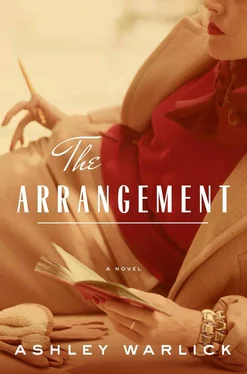“I’m sure it’s just a passing phase, Dote.”
“He’s found a job in Massachusetts.”
Edith began again. “You’ll move home then,” she said. “You will always have your home here with us, darling.”
This only made Mary Frances cry harder.
Later, in Rex’s office, she explained it another way. “Al and I have separated. Unless something drastic changes—”
“Your mother told me.”
“I’m afraid that got rather muddled.”
Rex sighed. “Well. We’ve been through this before.”
“Daddy, it’s not like that. I thought — and I guess Al thought — returning to Europe would be good for us, that he might write again, and other things would fall into place. But he only became more distant, and then my book was published…”
The more she talked, the clearer this version of events became. She had wanted to be a good wife, to have a baby with Al. He had come to not like her, to even despise her. She had tried. She had failed. Wasn’t that confession enough?
“So you are home to stay,” Rex said.
“I’m working on another book now,” she said. “A novel set in the hotel in the mountains at the end of the funicular — you remember it.”
“A novel.” Rex said. “How much longer to finish that?”
He sounded as if he were asking for corrections to the sports pages, or maybe how much it was going to cost, her staying on in Vevey.
“I don’t know,” she said. “I don’t think you can know.”
He leaned back in his chair, pulling his ankle across his knee. He was her father, and she owed him an explanation; they had always been close, and she wanted to give him one. But there was only so far she was willing to go.
Finally, “You’re a smart girl, Dote. You’ll figure it out.”
It seemed like the only kind of blessing she was going to get.
* * *
The next afternoon a letter arrived from Tim. Her mother handed it to her with a heavy sigh, as though Tim had presumed too much welcome to think he could write her here, now. Mary Frances made a point of opening it in front of her, the leaf of paper perfectly transparent. Tim missed her and felt compelled to count the ways.
“He needs some supplies when I return,” she said. “Some paints. I’ll have to go into the city.” She folded the letter and tucked it back into its envelope, her face flushing hot. “Shall we make a day of it?”
Her mother waved her hand vaguely, and Mary Frances walked away.
In her room, she read Tim’s words again and again, her fingers finding the parts of her he made rise and swell. Each day there was less of herself she would share with her family, these people she loved and now lied to freely, had even come to dread. Anne would be arriving by the weekend, all her righteous pride in tow.
And Sean, with neatly trimmed hair and short pants and knee socks, saddle shoes, and teeth, a mouth full of them when he grinned. He didn’t remember Mary Frances and whimpered when she came too close. She knew she shouldn’t be surprised. She’d hardly seen him in the last year and a half, but for some reason, his distance weighed against her heavily.
She and Anne sat underneath the lemon tree while Sean collected fruit, still green and hard as baseballs. He placed one at a time in Anne’s lap.
“I guess Mother told you, too,” Mary Frances said.
“Mother? Oh, Dote, come on. Your letters have been so dodgy. You hardly mention Al anymore. I just assumed.”
Mary Frances sighed.
“I know the signs,” Anne said.
“Well. You were right.”
“Yes.”
“Little comfort in that now.”
“You shouldn’t count on comfort for a while, Dote.”
Mary Frances agreed with everything Anne said but still refused to ask for her advice, to relinquish her position as the eldest. Sean kept with his back and forth. David stepped onto the porch, his hands hanging at his sides as he’d been taught. It was hard to remember him as a boy, like Sean now, doing anything so pointless. It felt as though they’d all assumed these places long ago.
There were only a handful of days left before her train.
But then Norah, who loved boys, who loved romance and intrigue and secrets, Norah came home! They stretched across her bed on their bellies, Norah still in her slip and stockings. Her date would be here any minute, but he was the sort of date you kept waiting. She and Mary Frances had been talking all afternoon.
“When did you know?” she asked.
“Oh, I was far too young to get married. That’s where you’ve been so smart, darling. You’re in college now, you’ve focused on your writing, your life.”
“Not really. Not enough yet, or like you.”
Mary Frances ran a palm down Norah’s glistening head. “But you will. And you’ll see how that changes you. And you’ll see which of these boys likes the way that changes you.”
“But with you and Tim?”
Mary Frances ducked her chin. “I loved him the moment I met him. I knew it was hopeless — his wife was beautiful, and he adored her. And I was married, and I thought I would stay married forever. But one night when he and Gigi were coming apart, we were there for a party, and I sat next to him on the piano bench where she had been practicing a song for a part in a film, and I was plinking along a bit, and I just said it. I turned to him and confessed I was deeply in love.”
Most of all this felt like the truth, voluptuous and flush with the sort of undercurrents that carried a good story. She could almost hear Tim asking what MFK Fisher longed for, that night at the piano. This version was as clear as any of the others she had conjured up the past few weeks: the stubborn sister, the dutiful wife, the abandoned woman. And what if she had confessed she was in love with Tim on that piano bench, all those years ago? Could they have saved themselves the trouble and just run away together then?
Were they running away now?
Norah laughed. “Oh, god, you are so fearless.”
“I was terrified! But I did make the direct approach.”
“And that was years ago.”
“Lifetimes,” she said.
Norah stood to slip her dress over her head, and Mary Frances felt a wash of something permanent and sad, something like mourning. She would never be so young and beautiful as Norah again, getting ready for a date. She could imagine suddenly the distance their conversations would acquire as Norah chose her way, and she returned to France.
What really happened, how it happened, that belonged to her and Tim.
* * *
At Le Paquis, he was waiting on the patio. She pressed herself against him, kissing the spot where her mouth fell against his neck. A warm wind stirred the meadow, beginning to green at the edge.
“It feels like a Santa Ana,” she said.
“The foehn . You brought it with you.”
She closed her eyes against it. “At home they said the Santa Anas drove people insane. I remember one winter our cook slit her mother’s throat then killed herself.” She turned to Tim. “She had the most beautiful long-handled French knife.”
Tim burst out laughing. He reached for her, his fingers playing at her neck, and she folded herself once again into the tight wrap of his arms, the rising, licking need to get inside. He pulled her down against him on the chaise, her hands already inside his clothes; the newspaper he had been reading fell away in leaves.
“I’m starving,” she said. “I haven’t eaten since breakfast.”
Something stirred in him to hear this, starving. Why would she neglect to feed herself? He put his hand on her knee and guided her back in the chaise as though she were a lithe craft under his sail.
* * *
Spring was coming. They started seeds in the perfect cups of eggshells and lined their sunny windowsills. They drove to the casino at Chillon for a dinner dance, for blackjack, took the funicular and hiked the mountain ridge. They strolled the market in Vevey, these last moments of leisure stretching out on the cusp of the season to come.
Читать дальше












